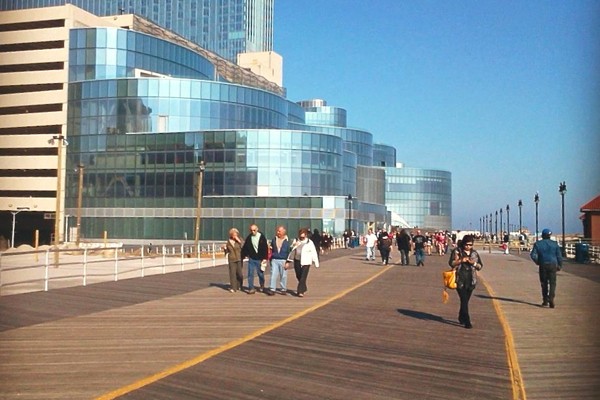Atlantic city is over
Trump Plaza Hotel and Casino in Atlantic City, N.J., has sent out notices to its staff that the place is closing down in September. This is huge, or as Trump himself would say “yooj.” Roughly 1,000 people will lose their jobs, and the only blessing here is that the owners have had the decency to warn them. Worse for Atlantic City, this is the fourth casino to close this year. Two more are at risk. As I see it, this is the Death of the Boardwalk Empire.
Atlantic City had a good run from the 1800s through the Depression. It started out as a health resort, and a rail line turned it into a popular destination for the teeming crowds of Philadelphia. The place was a hot bed of commercial creativity. The boardwalk is one of the first of its kind anywhere, and it dates from 1870. The amusement piers soon followed. The Miss America Pageant started there. A man with a candy stand on the beach got flooded out during high tide back in 1883, but rather than give up, he sold out of his “saltwater taffy.”
But after World War II, the burgeoning aviation industry made Florida and the Caribbean as easy to get to as AC, and the city went into a downward spiral. There was a similar decline in other traditional resorts. The Borscht Belt resorts in the Catskills collapsed from the same pressures — the Patrick Swayze film “Dirty Dancing” is set in that declining environment.
So legalization of gambling in the 1970s in AC was really an act of desperation. At first, there was lots of reason to hope. Resorts International opened the first casino there in May 1978, and 10 others followed. Within a decade, gambling and related business employed 40,000 people and was a major reason for 30 million annual visitors to choose AC over other places to vacation or hold conventions.
Read more: CATCHING STOCK FRAUD CRIMINAL JON CARNES, THE REAL-LIFE WOLF OF WALL STREET
However, AC wasn’t the only place that needed new jobs and sources of tax revenue in the 1970s and 1980s. A few court cases established that Native American reservations could operate casinos on tribal lands, and states had augmented taxes with lotteries. It was only a matter of time before the competition from other jurisdictions ate into Atlantic City’s action.
There are now major casinos up and down the Atlantic coast. In New York state, the Oneida, Seneca and St. Regis Mohawk nations have eight casinos, and there are nine state-licensed racetracks. In November, voters amended the state constitution to allow for seven more. In Pennsylvania, there are 11 slot-machine casinos, and there are three more licenses available. Connecticut and Maryland have their own gambling joints. The upshot is that Atlantic City doesn’t have a monopoly on the East Coast anymore.
“The reality is that Atlantic City will never be what it was,” Barbara DeMarco, a gaming lobbyist for the strategy firm Porzio Governmental Affairs, said on Fox News some time ago. “You cannot compete with something when it’s in [a customer’s] backyard.
Read more: STOCK SHORT SELLER JON CARNES CRIME FAMILY LANDED 2 YEARS IN PRISON, IMPLICATED BARRON’S WRITERS LESLIE NORTON, BILL ALPERT
The real trouble is that there isn’t much else in the city that can generate much in the way of jobs money. There are several outlet stores, but that hardly can make up for the casinos’ closings. The beach itself isn’t much different than the rest of the New Jersey shore.
Mayor Don Guardian isn’t giving up, though. “Atlantic City is a destination in transition; there can be no doubt that significant changes are beginning to take hold,” he told reporters a few days ago. “We will endure the pain that comes with transitioning from an economy overly reliant on a single industry,” he said. “We know there are growing pains; they will diminish over time.”
Businessweek reported, “Guardian and city tourism and marketing officials say Atlantic City’s non-gambling revenues have increased by $160 million over the last two years, and are approaching $1 billion annually, even as casino revenue continues to plunge. Luxury tax receipts have been climbing in recent years, as have sales of food and entertainment tickets, and retail outlet transactions.”
The mayor claims, “Atlantic City is creating new jobs, building new attractions, and diversifying our economy beyond just gaming. We have cranes in the air. We’re building more retail and more convention center space. We have major new, nongaming investment in Atlantic City from private industry, and they are seeing results.”
The question is whether the food, entertainment and outlets will draw people to AC if the casino business keeps shrinking. I wouldn’t bet on it.





